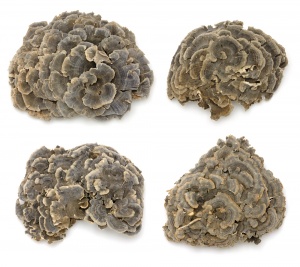Coriolus versicolor
| See Also | Botanical Monographs |
|---|
Coriolus (Coriolus versicolor) is best known for its use in the treatment of cancer. To explore the characteristics, medicinal uses and prescribing considerations of this herb in more detail, check out the references indicated. [1], [2]
White underbelly of Coriolus versicolor has thousands of pores instead of gills that do not discolour when you scratch them.[3] [4] The fan-shaped fruiting bodies resemble a spread out turkey tail and are variously colored. They overlap in groups on dead trees. The top of the mushroom is zoned in browns, whites, grays, or blues and has hairy bands.
Contents
Characteristics
Formerly: Trametes versicolor, Polyporus versicolor, Boletus versicolor, Polystictus versicolor
- Common Names: Turkeytail, Yun-Zhi (China), Kawaratake (Japan).
- Family: Polygonaceae
- Habitat: Coriolus versicolor is a shelf mushroom which grows on logs and trees for moisture but does not require sun. The top is brown, white, gray, and blue with a white underside. It is common in China, U.S.A. and Europe.
- Parts Used: Fruiting bodies, Mycelia grown on grain (freeze for 24 hours to prevent insect damage, then dry at 120 degrees F)
- Constituents: β-glucan-proteins (Coriolan, PSK): antitumor, antiviral, immunomodulating; Polysaccharide K (PSK) is 30% polysaccharides, 6% nitrogen, and 15% protein; Ergosterol (provitamin D2) derivatives: antitumour; Polysaccharopeptide (PSP): antiviral
- Medicinal Actions: antitumour, antimicrobial, immunomodulating, antioxidant. Also recently discovered to be antimalarial.[5]
Uses
Medical Uses:
- Used with cervical, breast, lung, gastric, colon, sarcoma, carcinoma, esophageal, and other cancers. PSK fights cancers and tumors by inhibiting the growth of cancer cells and by "stimulating a host mediated response." Natural Killer cells are also promoted to enhance the immune system. It is often used in conjunction with chemotherapy to increase cancer survival rates. PSK has also demonstrated itself to activate interferon production. Coriolus has also been found to regenerate damaged bone marrow, increase energy levels and offer pain relief in cancer patients
- Immunodeficiency:
- Treatment for Hepatitis B and C
- Malaria, impetigo and ringworm
- Other Conditions
- glomerulonephritis, sarcoidosis, nephritic syndrome, systemic lupus erythematosus, sclerosis, Bechet's disease
Prescribing Considerations
The information provided is intended to augment the treatment from a naturopathic doctor or other trained medical professional. Although most herbs are generally safe, it is recommended that you avoid self-prescribing especially when there is an underlying ongoing medical condition, if you are on any prescription medications or if you are pregnant or breastfeeding.
The studies use preparations of PSP and PSK in their trials. PSK is a commercial drug (Krestin) derived from hot water extractions of "mycelial cultures" rather than the actual mushroom. One particular trial involved dosing PSK orally at 3 grams per day for 3 months for gastric cancer and patients displayed an average higher survival rate.[6]
Formulations and Preparation
- Infusion - 20g/cup three times daily
- Dried - 5g daily
- PSP - 1-3g three times daily
- PSK - 3g daily
- Encapsulated extract - 200-3000mg twice daily on an empty stomach
Safety
The safety and prescribing considerations for this herb include:[7], [8]
- Generally considered safe. Doses of up to 15 grams daily of PSP have been taken long term with no observable side-effects.
- Side Effects: Occasional darkening of the fingernails can occur.
- Contraindications: None known.
- Drug-Herb Interactions: With PSK there was an increase in breast cancer survival rate when combined with "ftorafur chemotherapy" after surgery and mitomycin C. There was an observable drop in white blood cell count following three courses of chemotherapy when PSP was used as a pretreatment in combination with vincristine, cyclophosphamide, and 4' epidoxorubicin. Furthermore there were additional immunosuppressant effects noted when PSP was taken with cyclophosphamide such as reduced lymphocyte proliferation, Natural Killer cell function, white blood cell production, and the growth of the thymus and spleen.[8]
References
- ↑ Boon Heather, Smith Michael (2009) 55 Most Common Medicinal Herbs: The Complete Natural Medicine GuideSecond Edition Institute of Naturopathic Education and Research, CCNM Toronto.
- ↑ Godfrey Anthony, Saunders Paul, Barlow Kerry, Gowan Matt (2011) Principles and Practices of Naturopathic Botanical Medicine, Advanced Botanical Medicine. V3 CCNM Press, Toronto.
- ↑ Stamets Paul (June 1998) MycoMedicinals Information on Medicinal Mushrooms. Townsend Letter for Doctors & Patients.
- ↑ Walker Morton DPM (Oct 1998) The Medicinal Mushroom Properties of Coriolus Versicolor or PSK. Townsend Letter for Doctors & Patients.
- ↑ Lovy, Alenka, et al. (1999) Activity of Edible Mushrooms Against the Growth of Human T4 Leukemic Cancer Cells, HeLa Cervical Cancer Cells, and Plasmodium falciparum. Journal of Herbs, Spices, and Medicinal Plants;6(4).
- ↑ Reichert Ronald Use of PSK as an Immunomodulator with Chemotherapy. Health Notes;6(2), Bastyr Library.
- ↑ Stargrove Mitchell Bebell, Treasure Jonathan, McKee Dwight L (2008) Herb, Nutrient and Drug Interactions: Clinical Implications and Therapeutic Strategies.
- ↑ 8.0 8.1 Brinker Francis (1997) Herbal Contraindications and Drug Interactions: Plus Herbal Adjuncts With Medicines, 4th Edition Eclectic Medical Publications.
